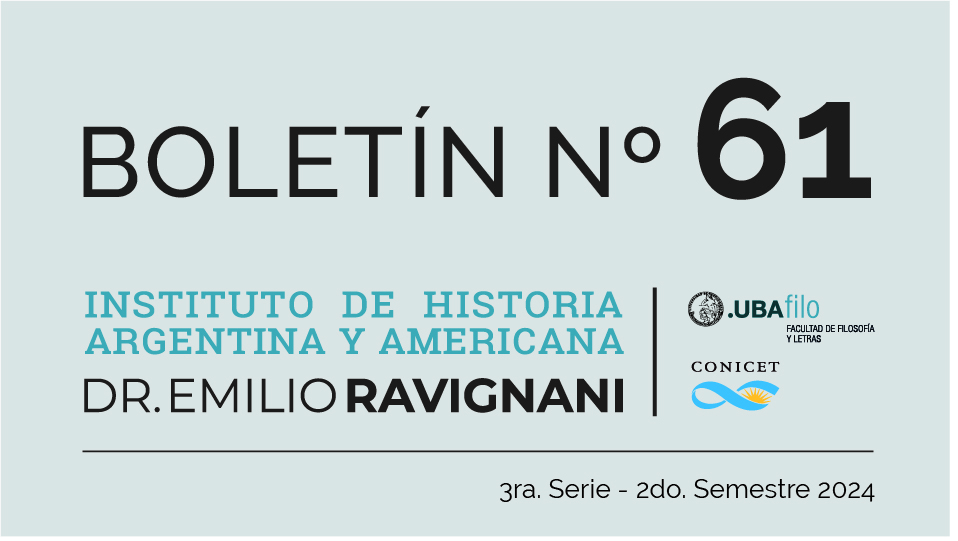About the power of dissent: reflections on the historiographic contributions of Sergio Serulnikov’s new book
Abstract
This essay offers a description of the content and a critical reflection of Serulnikov’s new work, organized five sections. First, the structure of this exhaustive book of political history is described and the central question that animates it is presented about “how the new is born”, or in other words, how historical change occurs. Secondly, the articulation of this book with the precedent on “ethnic political cultures” is made explicit. In the third instance, some lines of debate on the scope and limitations of the concepts of “culture” and “political culture” are recovered. The fourth part presents the historiographical position of the author regarding the old and new discussions about the causes and periodization of independence. Finally, it focuses on the scales and the biographical strategy with which the book works, to revisit the methodological question of the exceptional-normal.Downloads
References
Aguirre, C. (2018). ¿La segunda liberación? El nacionalismo militar y la conmemoración del sesquicentenario de la independencia peruana. En C. Aguirre y P. Drinot (Eds.), La revolución peculiar. Repensando el gobierno militar de Velasco. Lima: Instituto de Estudios Peruanos.
Contreras, C. y Glave, L. M. (2015) (Eds.). La independencia del Perú. ¿Concedida, conseguida, concebida? Lima: Instituto de Estudios Peruanos.
Grendi, E. (1977). Microanalisi e storia sociale. Quaderni storici, 35.
Kluckhohn, C. (1995 [1973]). Mirror for Man [1949]. Citado por Clifford Geertz, La interpretación de las culturas, p. 20.
Knight, A. (2007) ¿Vale la pena reflexionar sobre la cultura política? En C. Aljovín de Losada y N. Jacobsen (Dirs.), Cultura política en los Andes (1750-1950) (pp. 24-49). Nueva edición [en línea]. Lima: Institut français d’études andines, 2007 (generado el 30 de marzo de 2020). Disponible en: http://books.openedition.org/ifea/5786.
Loriga, S. (2012), La escritura biográfica y la escritura histórica en los siglos XIX y XX. Anuario IEHS, 27, pp. 163-183, p. 182.
Palti, E. J. (2010). Mito y realidad de la cultura política latinoamericana: debate de iberoideas. Buenos Aires: Prometeo.
Para seguir con el debate en torno al colonialismo... (2005). Nuevo Mundo Mundos Nuevos [En línea], Debates. https://doi.org/10.4000/nuevomundo.430
Quiroga, C. A. (25 de mayo de 2009). Celebración histórica muestra fractura política en Bolivia, Reuters: https://www.reuters.com/article/latinoamerica-bolivia-bicentenario-idLTASIE54O1DV20090525 (consultado en julio de 2023).
Serulnikov, S. (2006). Conflictos sociales e insurrección en el mundo colonial andino. El norte de Potosí en el siglo XVIII. Buenos Aires: FCE.
Serulnikov S. (2007). La imaginación política andina en el siglo XVIII. En C. Aljovín de Losada y N. Jacobsen (Dirs.), Cultura política en los Andes (1750-1950) (pp. 241-258, p. 250). Nueva edición [en línea]. Lima: Institut français d’études andines, 2007 (generado el 30 de marzo de 2020). Disponible en: http://books.openedition.org/ifea/5786.
Serulnikov, S. (2014). Lo muy micro y lo muy macro –o cómo escribir la biografía de un funcionario colonial del siglo XVIII. Nuevo Mundo Mundos Nuevos, Debates. https://doi.org/10.4000/nuevomundo.66758
Copyright (c) 2024 Boletín del Instituto de Historia Argentina y Americana Dr. Emilio Ravignani

This work is licensed under a Creative Commons Attribution-NonCommercial 4.0 International License.
The copyright is transferred to the Boletín, but the authors may retrieve them and reproduce their work in other media or formats by means of a written request to the Editorial Committee. In such cases, the Boletín will be cited as the first publication of the work.
The works are licensed under a Creative Commons Attribution-NonCommercial 4.0 International License, which allows others to share the work with an acknowledgment of their authorship and initial publication in this journal.
Also, by written request to the Editorial Committee of the Boletín, the authors may separately establish additional agreements for the non-exclusive distribution of the version of the work published in this journal (for example, placing it in an institutional repository or publishing it in a book), with an acknowledgement of its initial publication here. No commercial uses are allowed.



















